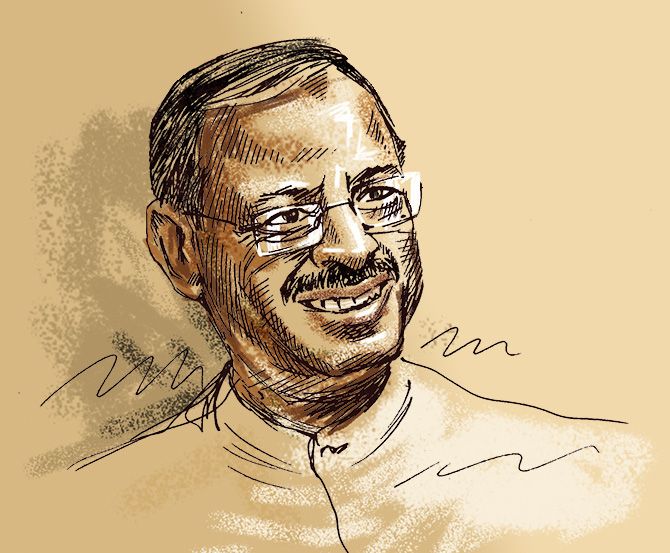At a Delhi hospital, a feeble old lady bumped into him.
She told him how she was absolutely alone in the world, severely ill, with no money for treatment but she did have a RSBY card.
She told him she no longer wanted to live and was eager to meet her maker.
'But when I meet him, I will definitely tell him how good your scheme is.'
Anil Swarup, who conceived the Rashtriya Swasthya Bima Yojana -- a scheme the United Nations Development Programme and the International Labour Organisation recognised as among the finest -- speaks to Anjuli Bhargava.
Illustration: Dominic Xavier/Rediff.com

Outspoken, politically incorrect and witty.
I have met civil servants of all hues during my career, but I am yet to meet one quite like this.
How has he survived in the dull, staid world that represents the Indian bureaucracy?
Not only did he survive, he thrived no matter which party was at the helm.
Anil Swarup, 1981 batch IAS officer, who retired on June 30 as secretary, HRD, passed the litmus test for a true civil servant: Managing to stand on neutral ground.
We are meeting at Verandah, at The Imperial in New Delhi, for lunch. We order two soups and a mezze platter that we agree to share.
He says he likes to keep it light at lunch but as I discover as the lunch progresses, "light" is putting it mildly. I have to push him to eat even an olive or two.
He begins by taking me on a quick roller-coaster ride of his career in his state -- Uttar Pradesh, compared to which stints in Delhi have been a baayen haat ka khel (a breeze).
In the 1990s, UP and its stark reality both "devastated" and "shocked" him. It was challenging -- corruption and crisis-ridden, lawless and dangerous on a daily basis.
His minister even had the title of Mister 25 per cent!
As sub-divisional magistrate in Hardoi and later as district collector of Lakhimpuri, he found himself in the thick of riots, agitations, floods, curfews, assassinations, murders and demolitions -- rather the mother of all demolitions, that of the Babri Masjid.
He is reserving the real story for his book due to be published later this year. A bureaucrat's life is all about pushing files? I have some rethinking to do here.
I ask how he dealt with the politicians, a tribe I have come to respect less and less with every passing year. He insists there is some good in everyone; one just has to appeal to their goodness.
I look as sceptical as possible as he holds forth on the politicians he has dealt with in his diverse stints.
The one politician who appears to have left a deep imprint on Swarup's mind is Kalyan Singh, a former UP chief minister and current governor of Rajasthan, for whom he was director, information and public relations.
He rates Singh high both for his ability to take criticism and heed advice, even from his subordinates, and his willingness to reprimand his own family if he found their conduct errant.
A sharp contrast with some of today's UP politicians who often let their kith and kin get away with murder -- literally.
In 1997, he found himself at the Centre and his first assignment was in the ministry of labour. In three months, he discovered the futility of this ministry -- "perpetually in pain" but "delivering nothing".
Every May -- when Delhi is the hottest -- a mob of ministry officials, industry representatives and union leaders find themselves in Geneva to solve the problems of Indian labour.
"We make sure we don't solve them; if the problems are solved, we wouldn't get to go to Geneva the next year," he says.
As a result, the ministry remained in labour, but couldn't deliver.
As he grappled with the "pains" of labour, Manmohan Singh announced a health insurance scheme that willy-nilly fell into his lap.
That was the birth of the Rashtriya Swasthya Bima Yojana (RSBY) in 2007 -- a scheme the United Nations Development Programme and the International Labour Organisation recognised as among the finest and the UPA counted as one of its successes.
The year was 2013. Swarup was due to return to his state after a seven-year stint at the Centre when he received a message from the cCabinet secretary.
There was a massive investment crisis and he would be put in charge of the Project Monitoring Group to fast-track projects.
He did what he could, but he soon ran into what looked like an "insurmountable" hurdle. The then environment minister Jayanthi Natarajan was refusing to clear projects.
"Neither reversing nor moving ahead; idling position so to speak," he explains.
Exasperated, Swarup toyed with the idea of returning to his state cadre. He could deal with the bureaucratic hurdles, but had no way of making the political masters see light.
That's when everyone woke up to the real problem and he was summoned by Montek Singh Ahluwalia.
Within weeks of that meeting, he learnt that Natarajan had been relieved of her position.
Whether this happened as a consequence or independent of it he doesn't know but this is the infamous tale behind what became famously known as the 'Jayanthi tax'.
The platter is excellent. I have demolished most of it and he has eaten like a bird.
I push Swarup to have dessert but he is unwilling to have coffee even. We sip our watermelon juices to justify holding our table for so long.
In November 2014, Swarup found himself in the "Gangs of Wasseypur" posting, heading the coal ministry.
The Supreme Court had cancelled the mining licences. Everything that could possibly go wrong had gone wrong.
That gave Swarup the confidence that whatever he did could only be an improvement.
He decided to do two things. Streamline the auction process so it couldn't be tampered with. No files or papers anymore.
"When I joined I had to work 24x7; by the time we finished this, I had 45 minutes of work a day."
He even went to the PMO twice to suggest winding up of the ministry!
The second was to attack the root cause of the problem. The only way to beat the coal mafia was to push up coal production.
A state-level strategy was devised to tackle the three primary reasons for the shortage.
"During my stint as coal secretary, all meetings were held in the states and it is making the states stakeholders that resolved the production crisis," he says. He travelled to the states every week instead of summoning representatives to Delhi.
Swarup's approach to the education sector has been on the same lines.
Within a few weeks of taking charge, he went on a "Bharat darshan", travelled to 20 states, meeting hundreds of teachers, students, district heads, block heads and school heads.
He realised that the country has fallen into the trap of importing solutions and emulating models that worked in other countries.
"A prime example of this is the no-detention policy that worked in a country like Finland but it was put in place with little understanding of the domestic reality," he argues.
Moreover, unlike coal where the mining was underground and the mafia over the ground, in education the mafia is underground and more deeply entrenched.
"You have to mine them out," he says.
Across 20 states, he found 111 home-grown solutions -- being carried out by NGOs, civil society organisations, individuals or even government schools that seemed to be delivering better results than the rest.
Twenty four have now been picked to be scaled.
"A decentralised approach may work best. Scale up what is working instead of spending time fretting over what is not," he adds.
What allowed him to travel so frequently is digitisation.
"Work no longer comes to a standstill when I travel. I can access the files from wherever I am," he explains.
Through our chat, I struggle to keep up with the thoughts he is keen on conveying through the self composed couplets in Hindi.
Mentoring juniors take up a fair bit of his time, he tells me.
A quick wit and a never say die attitude have helped him pull disillusioned juniors in the service back from the brink.
His advice to them is to try and make a difference within the domain in their control.
Focus on what you can do, not on what you cannot do.
As we come to the end of our lunch, he explains why he'd like to be a bureaucrat in his next life as well.
"You want to be honest, you can. You want to be dishonest, you can. You want to work, you can. You don't want to work, you needn't. Which other job gives you this kind of flexibility?” he laughs.
On a more serious note, he says he has received many "Bharat Ratnas" in his career, many of which will feature in his book. He ends with one.
At a Delhi hospital, a feeble old lady bumped into Swarup.
She told him how she was absolutely alone in the world, severely ill, with no money for treatment but she did have a RSBY card.
A kind neighbour had brought her to a hospital and she was being cared for, thanks to the insurance cover.
She told him she no longer wanted to live and was eager to meet her maker.
"But when I meet him, I will definitely tell him how good your scheme is," were her last words to him.











